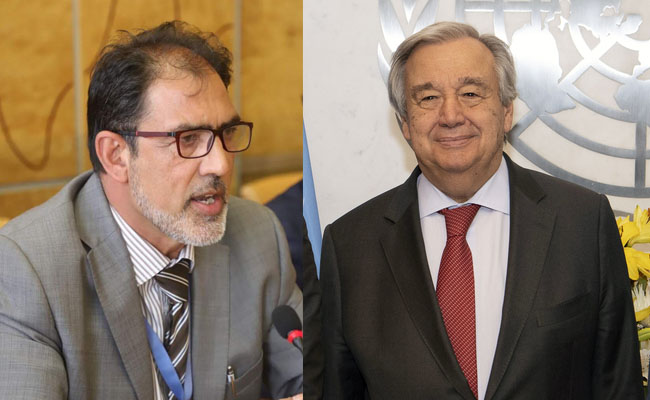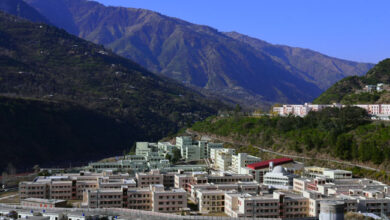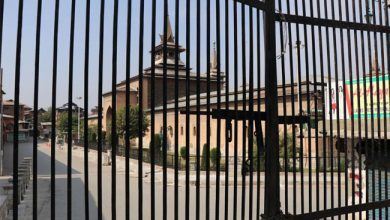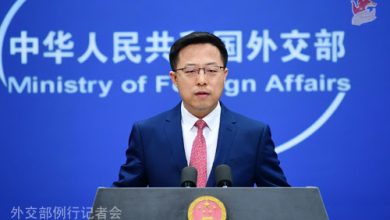KIIR chief writes UN SG, calls for revocation of anti-Kashmir laws

Islamabad: Veteran Hurriyat leader and Chairman Kashmir Institute of International Relations (KIIR) Altaf Hussain Wani has made a passionate appeal to the UN Secretary General Antonio Gutters urging him to mount pressure on India to revoke all anti-Kashmir-laws including new domicile law, which violates the United Nations resolutions that provide basis and structure for final disposition of the state through a fair and free plebiscite conducted under the auspices of United Nations.
In a communique addressed to the UN secretary General, the KIIR chief expressed his grave concern over new set of laws introduced by the government of India for Jammu and Kashmir. Terming these anti-Kashmir laws as a flagrant violation of international covenants Mr. Wani urged the UN Secretary General, High Commissioner for Human Rights Michele Bachelet, Human Rights Council President Elisabeth Tichy-Fisslberger, member states and civil society to impress upon India to revoke all laws which violate the United Nations resolutions of 13th August 1948 and 5th January 1949.
Referring to international covenants, which strictly restrict and restrain occupying states from altering demographic character of occupied area, Wani said, “The state of Jammu and Kashmir is an internationally recognized dispute between India and Pakistan and falls under Geneva Convention and Hague Regulations of 1907, which prohibit occupying states from altering the demographic character of the occupied area”. Being a signatory to the International Covenant on Economic, Social and cultural rights, the International Covenant on Civil and Political Rights, and United Nations resolutions on Kashmir India is legally and morally bound to protect the rights of Kashmiris defined in these agreements”, Wani said.
Highlighting the dangerous designs of the Indian government Wani said, “Indian desire to change the demography of the state has been operational since the day when it forcibly occupied the territory of Jammu and Kashmir in 1947”. “The physical elimination of the Muslim population in Jammu was formally started in 1947 followed by Indian military incursion in Kashmir”, he said adding that killing and targeting Muslim youth and manipulating of census figures and other coercive measures were used as an effective tool to change the demography of the state.
Shedding light on Kashmir’s age-old distinct identity the communique said, “Indian Occupied Jammu and Kashmir is home to 12.5 million people and comprises of 22 districts. Of these 22 districts, there are 17 Muslim-majority districts – 10 in Kashmir, six in Jammu and one in Ladakh, three Hindu-majority districts one Buddhist-majority district”.
Regarding maneuvering of statistics relating to the Muslim population by India in occupied Kashmir, the communique said, “The percentage of the Muslim population in Indian occupied is nearly the same as that of 1961 whereas the percentage of the Muslim majority in India has increased from 10.70% in 1961 to 14.23%.”
The main cause behind the decline of the Muslim Population in Kashmir he said was genocide and ethnic cleansing carried out by India against Kashmiris.
The communique further mentioned that the settlement of non-state subject immediately after 1947 was also an important factor for the decline of the Muslim population in several districts of the state particularly in Jammu province that witnessed large-scale killing of Muslims during the turbulent days of the partition of the subcontinent.
In their efforts to change the demographic composition of the state and to frustrate the people’s movement for right self-determination, the memorandum added that the successive governments of India adopted oppressive measures that including the killing of the innocent people, enforced disappearances, extra-judicial killings and forced migrations.
About abrogation of the Article 370 and 35 A of the Indian Constitution, the memo said that revocation of these laws led to bifurcation of the state into two Union territories. “This was merely done to fulfill the long-pending demand of Hindus to ease the restrictions of purchasing land/property inside the Muslim majority areas and trigger an inflow of settlers on large scale in the region”, the memo added.
“This constitutional onslaught indicates Indian strategy to neutralize the dispute by replacing existing Muslim majority with other ethnicities, thus consolidate New Delhi’s influence over the region and help in gradually lessening the intensity of the dispute”, the communique said adding that after the abrogation of the special status of the Jammu and Kashmir, the BJP government took multiple steps to change the demographic composition of the state.
“At a time, when the whole world was busy fighting the pandemic of COVID-19, the BJP government dropped yet another bombshell on Kashmiris thereby changing domicile rules of Jammu and Kashmir”, the communique said.
“The redefinition of domicile rules have caused fear psychoses among the inhabitants and is largely seen by locals as a conspiracy to change the demography of the state besides depriving them of their resources, jobs, identity, cultural, land and above the promised right of self-determination”, the KIIR chief said adding that the new law announced by the Indian Ministry of Home Affairs also provided domicile status to the children of Central government officials who have served in Indian Occupied Kashmir for a total period of 10 years.
Wani said that the constitutional onslaught by India clearly shows that to settle outsiders in Kashmir has been sole motive behind the Indian government’s plan to revoke Article 370 of the Indian constitution.
Urging world community to play its much needed role to address the age-old issue the KIIR chief said that the people of Jammu and Kashmir who are struggling for their right to self- determination despite all complexities hope that sooner or later the international community will fulfill its responsibilities and play its role for the resolution of the longstanding dispute pending on the United Nations agenda.





